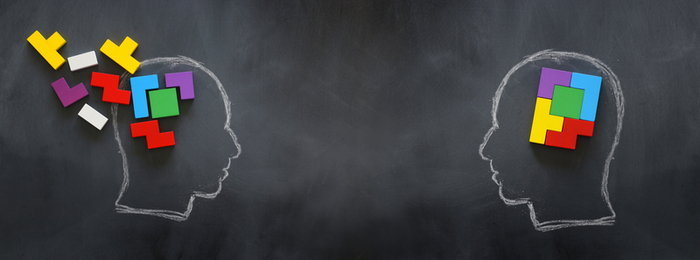
Contributor: Employees at Timberline Knolls Residential Remedy Middle
When somebody is affected by a psychological well being dysfunction, it’s not unusual for them to expertise signs of a number of co-occurring issues. Nevertheless, two forms of issues that aren’t often mentioned as occurring collectively are attention-deficit/hyperactivity dysfunction (ADHD) and consuming issues. But, there are theories relating to why and the way the signs of those situations overlap.
Similarities Between ADHD and Consuming Problems
Consideration-deficit/hyperactivity dysfunction is a psychological well being situation characterised by struggles associated to consideration, focus, hyperactivity, conduct regulation, and impulse management.
There are a number of forms of consuming issues, together with binge-eating dysfunction, anorexia nervosa, and bulimia nervosa, and plenty of signs of those issues mirror these of ADHD.
Individuals who endure from binge-eating dysfunction, for instance, battle with impulsivity and conduct regulation. Binge-eating dysfunction is a situation that causes folks to lose management over the quantity of meals they eat, typically discovering it troublesome to cease consuming as soon as they’ve began.
Some individuals who have ADHD flip to meals as a way of dealing with the each day struggles they typically face. In a way, they discover consolation in meals.
An article revealed in Duke Analysis Weblog states that roughly 30% of people that have binge-eating dysfunction even have ADHD [1]. Along with having comparable signs, individuals who have an consuming dysfunction like binge-eating dysfunction have a higher sensitivity to how meals can influence the mind’s reward system. When somebody’s reward system is triggered, it signifies that the degrees of dopamine, which is the first chemical within the mind that controls emotions of enjoyment, have elevated [2]. On this sense, meals can be utilized as a coping mechanism for coping with misery.
Individuals who have ADHD usually face each day struggles by way of efficiently functioning in an acceptable method in school, at work, or in social settings. This could result in immense emotions of stress and nervousness, and a few might discover that consuming makes them really feel higher. Nevertheless, the impulsivity and lack of ability to control conduct which might be hallmarks of ADHD could cause these folks to lose management over the quantity they eat, finally tying within the signs of binge-eating dysfunction.
Commercial
Binge-eating dysfunction just isn’t the one consuming dysfunction linked to ADHD. Anorexia, which is an consuming dysfunction that facilities on limiting meals consumption to the purpose that an individual turns into dangerously underweight, has been linked to ADHD by way of how individuals who have both of those issues are inclined to battle with setting boundaries. Bulimia, an consuming dysfunction characterised by binge consuming and purging, shares similarities with ADHD as a result of individuals who have bulimia battle to regulate their impulse to eat excessively in the identical method that individuals who have ADHD battle to regulate their impulsivity.
A further similarity between consuming issues and ADHD is the sensation of guilt and disgrace that may accompany the behaviors individuals who have these issues interact in. Appearing impulsively and being unable to control one’s behaviors and feelings could cause individuals who have ADHD to really feel ashamed. Likewise, individuals who have consuming issues typically really feel an immense sense of guilt and disgrace after partaking in disordered consuming behaviors.
Treating ADHD and Consuming Problems
For an individual to heal from the signs of attention-deficit/hyperactivity dysfunction and a co-occurring consuming dysfunction, they need to obtain complete remedy that addresses all their signs. Whereas ADHD and consuming issues might share similarities, they aren’t the identical, they usually can’t be handled as if they’re.
Remedy professionals will use various kinds of therapies when treating somebody who has ADHD and an consuming dysfunction. Cognitive behavioral remedy (CBT) is without doubt one of the most typical remedy modalities used as a result of it focuses on confronting and addressing unfavorable thought patterns and problematic behaviors. As folks start to determine their ideas and behaviors and acknowledge the methods by which they’re unfavorable or distorted, they will work with their therapist on studying the best way to redirect their ideas and management their behaviors. In doing so, they’re additionally in a position to start creating varied coping mechanisms. In the end, this could change the way in which these folks really feel about themselves, rising their confidence of their potential to control and management their actions [3].
Dialectical conduct remedy (DBT) is one other sort of remedy technique that can be utilized with sufferers who’ve ADHD and consuming issues. DBT focuses on acceptance and alter. The American Journal of Psychotherapy identifies the 4 abilities modules included in DBT as mindfulness, interpersonal effectiveness, emotion regulation, and misery tolerance [4].
Particular person, group, and household therapies can be useful when treating sufferers who’ve consuming issues and ADHD. Particular person remedy offers sufferers time to speak with a therapist in a confidential, one-on-one setting. Group remedy permits folks to have a possibility to have interaction in open discussions with different people who might have had comparable experiences and struggles. In household remedy, relations can turn into educated concerning the issues themselves whereas additionally studying methods to assist the affected person outdoors of the remedy setting.
Psychotropic drugs are sometimes used within the remedy of ADHD and consuming issues. Whether or not or not an individual ought to take medicine, nonetheless, is one thing that must be mentioned with a psychiatrist.
References
[1] Haurin, S. (2018, March 13). Understanding the hyperlink between ADHD and binge consuming might level to new remedies. Duke Analysis Weblog. https://researchblog.duke.edu/2018/03/13/binge-eating-disorder/ [2] Man-Evans, O. (2021, July 8). Mind reward system. SimplyPsychology. https://www.simplypsychology.org/brain-reward-system.html [3] Sherman, C., Ramsay, J.R., & Barrow, Ok. (2021, August 24). How CBT dismantles ADHD negativity: cognitive behavioral remedy overview. https://www.additudemag.com/cognitive-behavioral-therapy-for-adhd/ [4] Linehan, M.M., Wilks, C.R. (2018, April 30). The course and evolution of dialectical conduct remedy. The American Journal of Psychotherapy. https://psychotherapy.psychiatryonline.org/doi/10.1176/appi.psychotherapy.2015.69.2.97
About Timberline Knolls

Timberline Knolls is a residential remedy heart situated on 43 stunning acres simply outdoors Chicago, providing a nurturing restoration setting for ladies and women age 12 and older who’re combating consuming issues, dependancy, trauma, and co-occurring psychological well being situations. An grownup partial hospitalization program (PHP) is accessible for step-down and for ladies to straight admit. By serving with uncompromising care, relentless compassion, and an unconditional joyful spirit, we assist our residents and purchasers assist themselves of their restoration. For extra data, please go to www.timberlineknolls.com.
The opinions and views of our visitor contributors are shared to offer a broad perspective of consuming issues. These will not be essentially the views of Consuming Dysfunction Hope, however an effort to supply a dialogue of varied points by totally different involved people.
We at Consuming Dysfunction Hope perceive that consuming issues end result from a mix of environmental and genetic components. If you happen to or a liked one are affected by an consuming dysfunction, please know that there’s hope for you, and search rapid skilled assist.
Printed on April 7, 2022. Printed on EatingDisorderHope.com
Reviewed & Authorised on April 7, 2022 by Jacquelyn Ekern, MS, LPC


